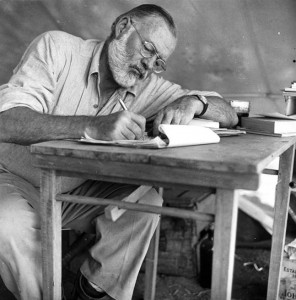As a follow up to last week’s post The Importance of Father-Son Proximity and Initiation into the Masculine Culture I wanted to use a a classic novel to demonstrate the recurrent theme of the absent father causing sons to try to “fly above” the father in United States’ culture. As mentioned last week, the themes to be discussed are ideas from Robert Bly’s book Iron John: A Book About Men suggested to me and discussed with my friend Will Stewart. I will attempt to introduce two new concepts: Shame and ashes.
Bly uses various fairytales to make his points. I will use Hemingway’s Robert Jordan, the protagonist from For Whom the Bell Tolls. Jordan suffers from a misunderstanding of their fathers due to lack of information and absenteeism.
Robert Jordan is an American university level Spanish teacher from Montana. My impression is that he was traveling/living in Spain when the Spanish Civil War began. In my opinion, he is one of the most complicated and fascinating men in fiction. Jordan fights against the Facists with the Republicans. He is an explosives and demolitions expert tasked with blowing up a bridge vital to the Republican’s taking a key city. During his time in the mountains assembling like-minded civilians for the task, he falls in love with a young girl.

For those that can access the book, the discussion that follows is from the end of Chapter 30 where Jordan’s thoughts about his grandfather and father are revealed. Jordan describes various objects that demonstrated his grandfather’s heroism in the American Civil War. Of particular interest is “a single action , officer’s model .32 caliber and there was no trigger guard. It had the softest sweetest trigger pull you ever felt and it was always well oiled and the bore was clean although the finish was all worn off and the brown metal of the barrel and the cylinder was worn smooth from the leather of the holster. It was kept in the holster with a U.S. on the flap in a drawer in the cabinet with its cleaning equipment and two hundred rounds of cartridges. There cardboard boxes were wrapped and tied neatly with waxed twine.”
Clearly this is a revered relic of Jordan based on his detailed remembrance and of his grandfather based on the care he took to display and take care of it. It is a reminder of the grandfather’s heroism, service, discipline, and possibly a monument to those he killed. What does Jordan’s father do with the iconoclastic pistol?
“Then after your father had shot himself with this pistol, and you had come home from school and they’d had the funeral, the coroner had returned it after the inquest saying, ‘Bob, I guess you might want to keep the gun. I’m supposed to hold it, but I know your dad set a lot of store by it because his dad packed it all through the War.'” Jordan’s father used the pistol he supposedly “set a lot of store by” to kill himself. Why? Possibly he was ashamed of his life and wanted to hurt his father by killing himself with the gun he was so proud of. Was it an act of rebellion? Jordan, who clearly revered the gun by the way he described it, throws the gun to the bottom of the lake a day after it was returned. The gun, once a source of pride, is a source of shame.
As Jordan faces the possibility of his own death, his wishes for his grandfather, who he believes has the skills to lead his band of misfits through the blowing of the bridge the next day to safety. Jordan, who may have placed himself in a war of which he had no national allegiance, to commit suicide under the guise of “flying above” his father. As he wishes to survive well beyond the war, based on his love for Maria, Jordan wishes his grandfather and his life saving skills would be present with him. “Maybe he sent me what little I have through that other one that misused the gun.” Jordan is so ashamed of his father’s suicide that he refers to him as “that other one who misused the gun.”
Jordan’s shame for his father is clear. “I’ll never forget how sick it made me the first time I knew he was a cobarde…Coward. It’s easier when you have it said and there is never any point in referring to a son of a bitch by some foreign term. He wasn’t any son of a bitch though. He was just a coward and that is the worst luck any man could have. Because if he wasn’t a coward he would have stood up to that woman and not let her bully him. I wonder what I would have been like if he had married a different woman?” Another source of shame is that “that woman”, possibly his mother, bullied his father. Jordan wondering “what he would have been like” indicates that he feels something is lacking in himself.
And so we see, in a novel in 1940, the concept of a young man hoping that his elder passed him survival skills, having shame for his father, and questioning his worth. Jordan may have been committing suicide by joining the war but “flying above” his father by doing it for an altruistic motive, defeating the fascists, while trying to complete the initiation to masculinity started by his grandfather.
“He understood his father and he forgave him everything and he pitied him but he was ashamed of him.” The exact verbiage of shame is used by Hemingway.
Jordan also believes that he had no right to ask his grandfather to tell him about the men he killed. Jordan now believes, possibly because he has been initiated into the world of killing men at war, that he has the right to ask his grandfather about the men he killed. Does this signify Jordan becoming closer to his masculine elder postmortem? Is this type of relationship necessary? Could it be instructive in psychotherapy?
Bly writes of “ashes.” A time when men must fall to the bottom, be humbled, work with their hands, and emerge. He opines that it is especially important for men of middle class and relatively well-off upbringing to go into the ashes. I believe Jordan’s ashes are the war, even though I think he originally entered with thoughts of an altruistic suicide. He will emerge from the ashes stronger and with a will to live. He will be a better lover, as he commits to Maria’s surrogate father his intent to marry her after the war.
Can our understanding of male initiation, shame, and ashes help us treat men more holistically? Could it reduce suicide, post traumatic stress disorder, depression? Cancer, diabetes, heart disease? The divorce rate?
Those are admittedly pretty big leaps, but the concept of the shame of the absent father and lack of initiation was clearly an issue Hemingway wanted to communicate in the late 30’s.
Tomorrow we will travel to Miramar, Florida over 40 years later. Maverick’s shame and lack of understanding of his father’s death literally feeds his reckless quest to “fly above” his father’s ghost. Like Robert Jordan, he may fly the way he does because he wishes to commit an altruistic suicide as well. More tomorrow…



